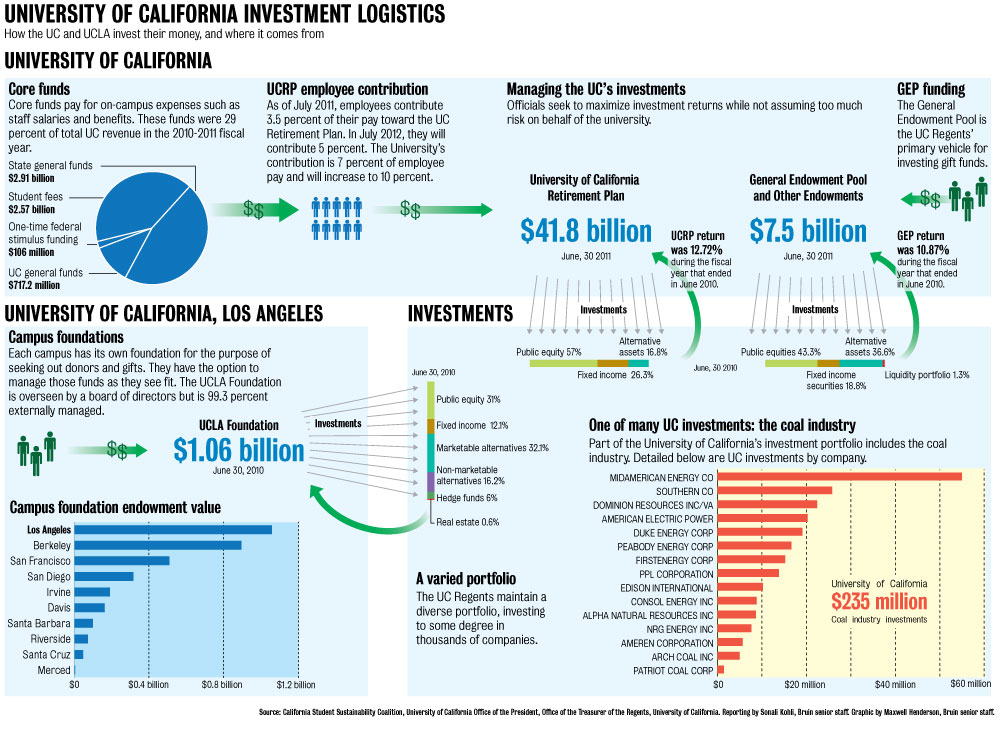A group of California students is working to discourage public universities from investing in coal, citing negative social and environmental effects.
The California Student Sustainability Coalition released a report that discusses coal investments in the University of California, California State University and the California Community Colleges systems.
As of June 2011, the UC had invested $235 million in major coal companies in the country, according to records obtained by Sarah Siedschlag, an independent researcher the student coalition hired in the summer of 2011 to write the report. This is a fraction of the $71.5 billion the UC Board of Regents manages, according to the 2010-2011 UC Treasurer’s Annual Report.
The report discussed the negative environmental impacts of using coal, such as the release of greenhouse gases and polluted water sources, as well as health impacts related to using and mining coal.
It also stated that as restrictions on greenhouse gas emissions increase, coal use may decrease and it would be a less profitable investment.
The ultimate goal of the coalition is for the UC to divest from coal altogether, said Kitty Bolte, outreach coordinator for the student group that published the report.
The UC has divested from other areas before, such as tobacco and companies in Sudan, after coming under pressure from students and human rights activists.
Coal, however, is a profitable investment, and the UC does not plan to stop investing in it, said Dianne Klein, a spokeswoman for the UC Office of the President.
The goal of UC investments is to maximize the returns and to meet a specific economic goal, so the UC Office of the Treasurer considers economic factors in choosing its investments, Klein said.
Currently, the UC puts large amounts of money into indexes, which are collections of top companies worldwide that investors can choose from. To stop investing in coal, the UC would have to ask its investors to provide a list of companies that does not include those involved in coal mining or operations ““ the same way it did with Sudan or tobacco.
The UC’s current financial state limits flexibility to consider any factor other than what will bring it the most economic gain, which will make it difficult for students to achieve their goal of divestment, Siedschlag said.
The coalition’s report suggests other ways to improve the UC’s investments, such as requesting the university to be more transparent with its investments, increasing student input and encouraging individual campuses to invest in environmentally and socially responsible companies.
At UCLA, third-year environmental science student Maanya Condamoor is leading this effort.
She’s the co-leader of an Action Research Team in the Education for Sustainable Living Program, and she is working to create an advisory committee that would recommend socially and environmentally responsible investments for the UCLA Foundation.
It’s in the university’s best interests, she said.
“In a lot of different schools, responsible investments have been shown to outperform non-responsible investments,” Condamoor said.
Condamoor’s group is working with Julie Sina, a vice president and treasurer of the UCLA Foundation. Sina has not yet seen a proposal, but said she would be receptive to an advisory board.
Other private universities have similar advisory boards, said Condamoor, who is also the UCLA representative for the state-wide coalition’s End Coal campaign.
Condamoor said the goal is to set up the committee by fall 2012, ensure that it has student representation and over time bring up the topic of removing coal investments.
Contributing reports by Samantha Masunaga, Bruin senior staff.
